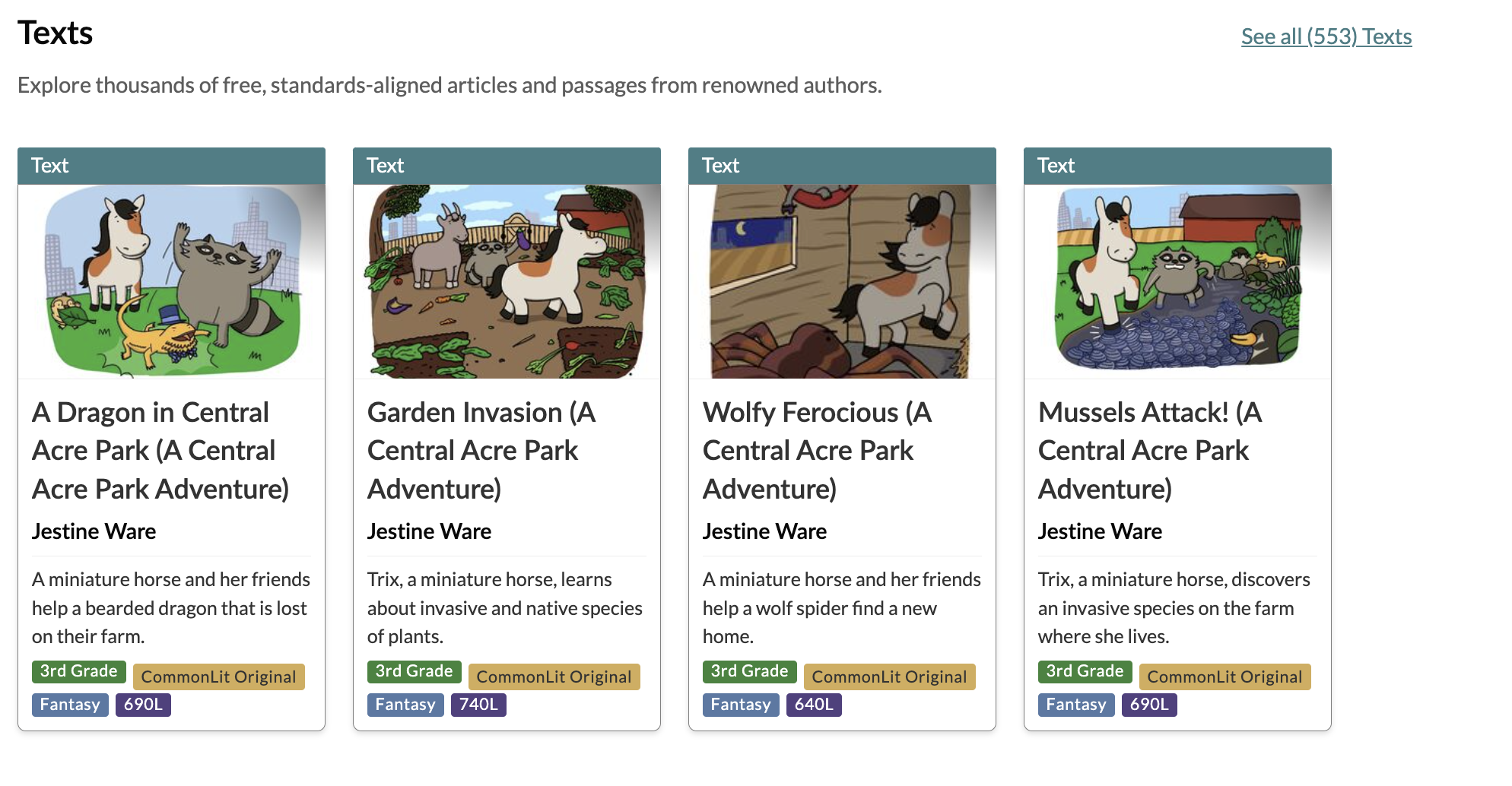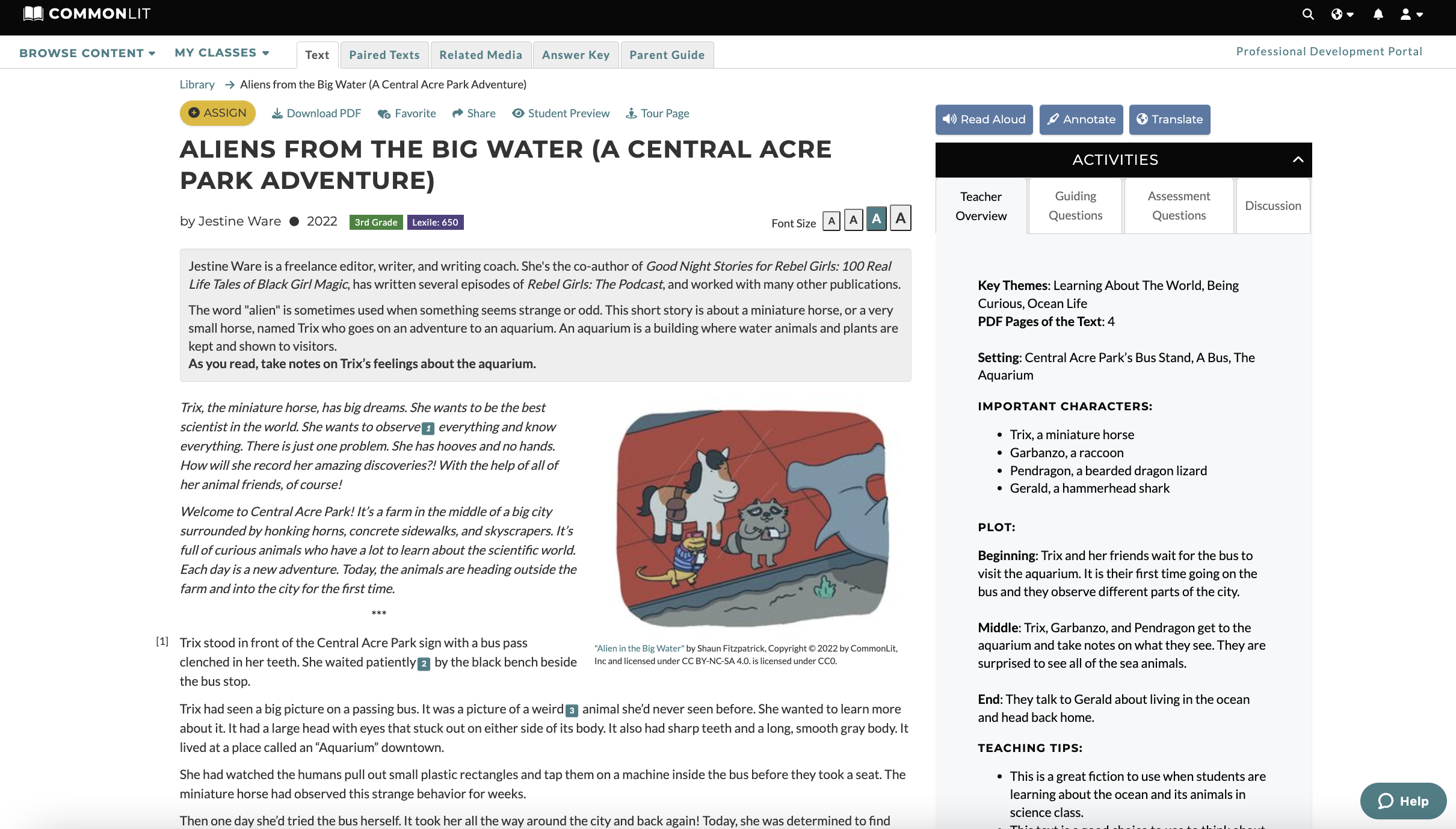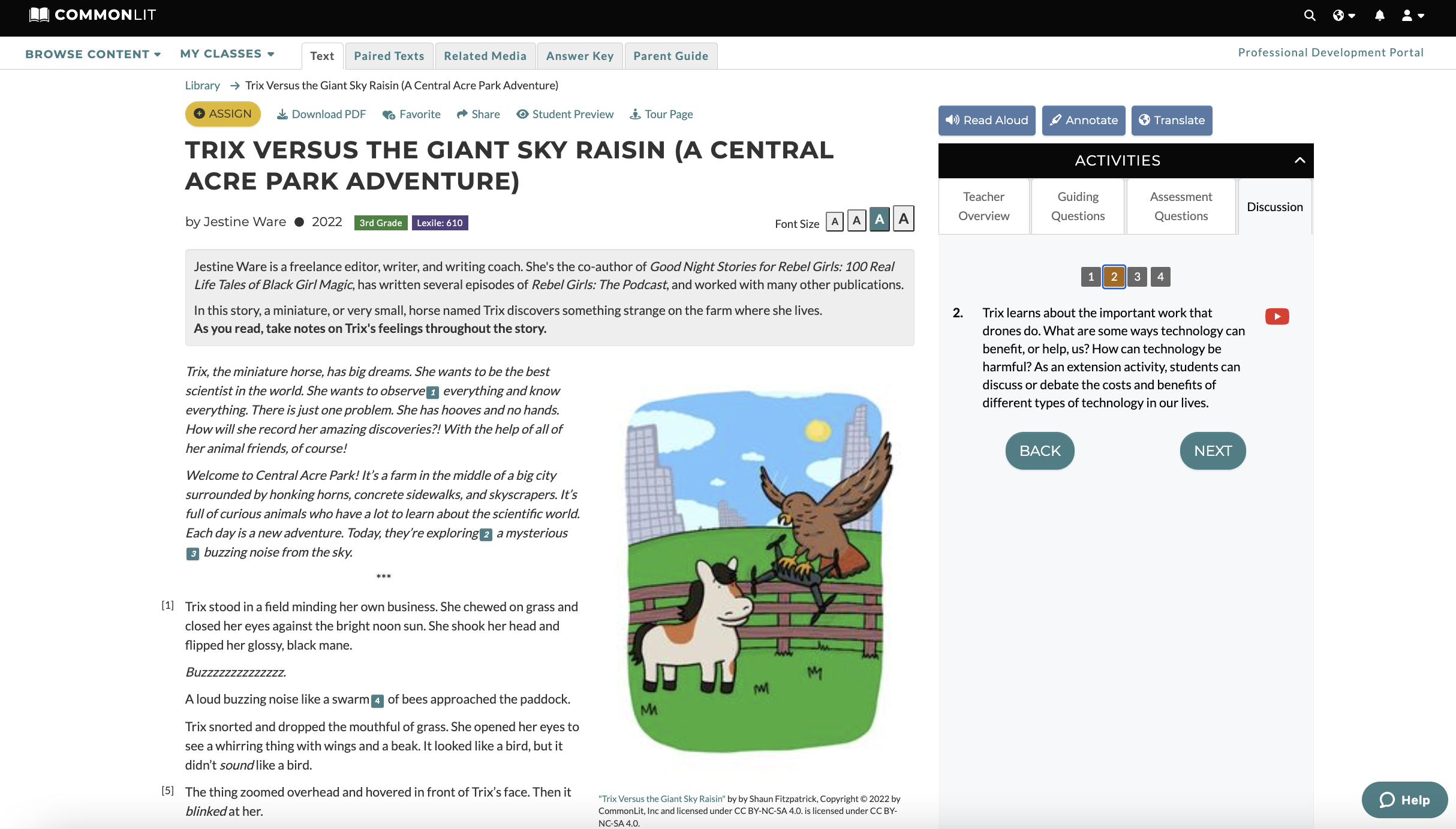CommonLit’s online digital literacy program offers an abundance of texts to best support elementary reading comprehension, including CommonLit Originals. CommonLit Originals are exclusively found on CommonLit and include stories by famous authors like Gary Soto and Lucy Tan. Additionally, the CommonLit Originals project aims to build a robust and representative selection of children's literature by commissioning award-winning authors to write stories with timely, diverse themes.
In this blog, we will walk you through seven original elementary texts by Jestine Ware, an author, editor, and writing coach. Ware’s works include Good Night Stories for Rebel Girls: 100 Real Life Tales of Black Girl Magic, several episodes of Rebel Girls: The Podcast, and now, the Central Acre Park Adventure series, found only on CommonLit!
Central Acre Park Adventure Series by Jestine Ware

This lighthearted series contains seven fiction short stories for elementary students, exclusive to CommonLit. The series centers around a group of scientifically curious animals living on a farm in a big city. In each story, the farm animals work together to explore environmental issues by scientific discovery! Introducing students to scientific topics through relatable fiction tales is an excellent way to spark interest in exciting scientific topics while helping your young readers build their reading comprehension skills. Introducing environmental fantasy stories to elementary students is also a great way to add a flair of science into your ELA classroom!
“A Dragon in Central Acre Park” (3rd Grade)
When Trix and her farm friends find a distressed bearded dragon, they work together to help him get home. After searching around the city, they realize that the bearded dragon’s owner is nowhere to be found and bring him back to the farm.
After reading, ask Discussion Question 3 to encourage students to make text-to-self connections. “Trix and her friends try to help the bearded dragon find his human and then give him a place to stay. Think of a time you helped someone. What did that person need, and how did you help? How did it feel to help?”
“Aliens from the Big Water” (3rd Grade)
Trix and her friends go to the aquarium and become fascinated by the alien-like creatures swimming in the tanks. They talk to a great hammerhead shark who tells them about saltwater creatures and the ocean. The friends leave, pleased with their newfound knowledge.
Introduce students to the great hammerhead shark with the Shark Academy video under Related Media. After reading the story and watching the video, ask students for their opinion on the video. How does this add to what they learned in the story? How would the story be different if Trix and her friends talked to a hammerhead shark in the ocean instead of the aquarium?

“Mussels Attack!” (3rd Grade)
Students may have seen clusters of zebra mussels while playing in bodies of water, but they may not know that these mussels are one of the most harmful invasive species in North America. In this short story, Trix, the miniature horse and protagonist of the series, and her farm friends, remove the zebra mussels out of the farm pond, helping to protect the environment.
Pair this text with “Toad-ally Taking Over” to explore the cane toad, an invasive species of toad in Australia. After reading both texts, ask students to discuss the invasive species presented in each text. What do these two texts teach readers about invasive species and why they are harmful to the environment? We also have a Target Lesson on this text which can be used for targeted reading intervention and to help students identify the main idea of the text.
“Garden Invasion” (3rd Grade)
In this story, Trix accidentally leaves the door to the garden open. When she wakes up, the garden has been destroyed. Trix teams up with Garbanzo and Godfrey, a helpful goat, to clean the garden and learn about invasive and native species as they try to figure out who destroyed the garden.
Pair this story with “Mussels Attack!” from the same series and ask students to compare the texts. How is the information Trix learns in these two texts alike and different?
“Trix Learns to Love Winter” (3rd Grade)
Trix, like many students (and their teachers), dreads winter – the dark, the cold, the ice. She especially hates pulling small children around the farm in a sled. To get out of her work, Trix pretends she is injured, limping around the farm. She is so focused on pretending, that she slips on ice and twists her leg. The small children take care of her, and Trix decides winter may not be so bad after all.
After reading this story, have students read the classic fable, “The Boy Who Cried Wolf,” in the Paired Text tab and have students compare the common themes between the two stories. Why does the boy and Trix lie? How are Trix’s actions similar to and different from the boy? What do Trix and the boy’s actions show about the importance of truth telling?
“Trix Versus the Giant Sky Raisin” (3rd Grade)
Trix becomes curious when she sees an odd looking insect buzzing around the field one day. Mariel, a monarch butterfly, explains that the odd insect is actually a drone that people are using to help study and protect monarch butterflies along with other endangered species.
We often think of technology as something that hurts the environment, but many new technologies are helping protect animals worldwide. This story will teach students about the ways technology can help us protect the natural areas we love. Students can discuss or debate the costs and benefits of different types of technology in our lives after reading this text.

“Wolfy Ferocious”(3rd Grade)
In this hilarious short story for third graders, Trix becomes irritated when a wolf spider insists that he will eat her and follows her and her friends around the farm. Trix discovers that the annoying spider had his nest destroyed and is worried about getting enough food to eat. Trix decides to help the wolf spider find the perfect location to build his new home.
This story will not only teach students about wolf spiders, but give them an opportunity to reflect on their own feelings and actions. Ask students Discussion Question 2, “Even though Wolfgang is small, he acts ferociously in front of Trix and her friends. Think of a time you acted brave but you actually felt scared on the inside. What were you afraid of? Why did you act brave? In what other situations might people act brave but feel scared on the inside?”
Do your elementary students love exploring the natural world with Trix and her farm friends? We are releasing more Central Acre Park Adventure stories soon!
Next Steps
Interested in more short stories for elementary students that center diverse voices and cover current events? Check out CommonLit original short stories in our library!
If you’re interested in learning all about CommonLit’s free digital literacy program, join one of our upcoming webinars!


